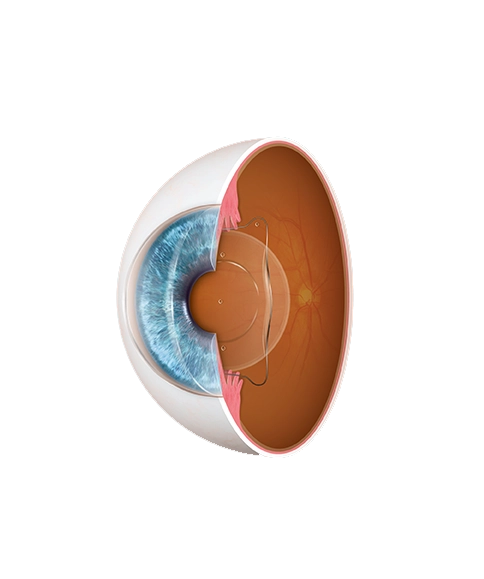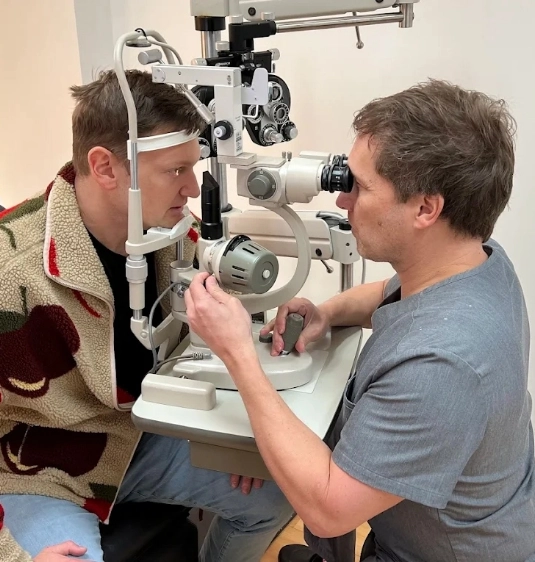
EVO ICL™
If glasses and contacts no longer fit your lifestyle—but you’ve been told you’re not a candidate for LASIK—EVO ICL may be the right option for you. This advanced, additive procedure corrects nearsightedness and astigmatism from inside the eye, offering sharp, stable vision without removing corneal tissue.

Whether you have thin corneas, struggle with dry eye, or simply want a long-term alternative to contact lenses, EVO ICL offers new possibilities. Dr. Rex Hamilton provides personalized vision correction in Beverly Hills for patients throughout Los Angeles and LA, helping them see clearly and live fully.

What is EVO ICL?
EVO ICL is a breakthrough vision correction procedure that uses an Implantable Collamer™ Lens to treat moderate to severe myopia (nearsightedness) and astigmatism. Unlike LASIK or SMILE, which reshape the cornea using a laser, EVO ICL adds a thin, flexible lens to your eye—without removing any corneal tissue. This FDA-approved, phakic lens sits between the iris and your natural lens, working with your eye’s anatomy to deliver sharp, stable vision.
Because EVO ICL leaves the natural lens intact, it’s an excellent option for people with thin corneas, dry eye syndrome, or those who aren’t ideal candidates for laser eye surgery. The lens is made of biocompatible Collamer, a material that contains collagen and integrates naturally with the eye while offering built-in UV protection. It’s also removable, giving patients more flexibility than permanent procedures.
With high patient satisfaction and the potential for clearer night vision, EVO ICL is changing how people approach vision correction—offering long-term clarity without glasses or contact lenses.
Take the first step toward sharper, more independent vision with a one-on-one LASIK evaluation. Book your consultation today.
EVO ICL Procedure
What are the Benefits of EVO ICL Surgery?
EVO ICL offers life-changing clarity without the limitations of glasses, contact lenses, or laser vision correction. As a next-generation solution for nearsightedness and astigmatism, it comes with a host of benefits that set it apart from other vision correction options:

Exceptional Vision Quality
EVO ICL provides sharp, high-definition vision—day and night. Many patients report improved contrast sensitivity and
Trusted Source
Effect of the EVO+ Visian Phakic Implantable Collamer Lens on Visual Performance and Quality of Vision and Life, Am J Ophthalmol 2021;226:117-125
Martínez-Plaza E, López-Miguel A, López-de la Rosa A, et al
Go to Source
night vision,
even in low-light
Trusted Source
Evaluation of the EVO/EVO+ Sphere and Toric Visian ICL: Six month results from the United States Food and Drug Administration Clinical Trial
Packer M
Go to Source
settings.
Preserves Corneal Tissue
Because EVO ICL is an additive procedure, it doesn’t involve removing any corneal tissue. This makes it an ideal option for patients with
Trusted Source
Phakic Intraocular Lens Implantation in United States Military Warfighters: A Retrospective Analysis of Early Clinical Outcomes of the Visian ICL
Parkhurst GD, Psolka M, Kezirian GM
Go to Source
thin corneas
or irregularities that rule out LASIK or PRK.
Reduces Dry Eye Risk
Unlike laser eye surgery, EVO ICL does not disrupt the corneal
Trusted Source
Matched population comparison of visual outcomes and patient satisfaction between 3 modalities for the correction of low to moderate myopic astigmatism
Ganesh S, Brar S, Pawar A
Go to Source
nerves,
so it’s less likely to cause or worsen
Trusted Source
Analysis on the changes of objective indicators of dry eye after implantable collamer lens (ICL) implantation surgery
Zhang H, Deng Y, Ma K, Yin H, Tang J
Go to Source
dry eye
—a major advantage for patients with pre-existing dry eye syndrome.
Reversible and Adjustable
The Implantable Collamer Lens is designed for long-term use but can be removed or replaced if necessary. That flexibility provides peace of mind as your eyesight and eye health evolve over time.
Biocompatible Material
Made from a unique, collagen-based material called Collamer, the lens works in harmony with the eye’s natural structures. It also includes built-in UV protection to shield your eyes from harmful rays.
Quick Procedure, Fast Recovery
EVO ICL surgery typically takes 20–30 minutes per eye, and most patients are back to their usual routines by the next day. Follow-up care is simple, and side effects are typically mild.
Proven Satisfaction
In clinical studies,
Trusted Source
The Implantable Collamer Lens with a central port: review of the literature
Packer M
Go to Source
99.4%
of ICL patients said they would choose the procedure again—an extraordinary endorsement of its safety and effectiveness.6

Am I a Good Candidate for EVO ICL?
If you’re exploring vision correction options but have been told LASIK isn’t right for you, EVO ICL may offer an ideal alternative. This innovative eye surgery is designed for people with moderate to severe nearsightedness (myopia) and astigmatism—especially those who may not qualify for laser vision correction procedures like LASIK or PRK.
You may be a candidate for EVO ICL if you:

- Are between the ages of 21 and 45
- Have a stable vision prescription (with little to no change over the past year)
- Have moderate to severe myopia, with or without astigmatism
- Have healthy eyes, free from significant eye disease, glaucoma, or uncontrolled dry eye
- Are seeking a long-term solution to reduce dependence on contact lenses or glasses
- Have thin corneas or other factors that make LASIK or PRK less suitable
Because EVO ICL doesn’t involve reshaping the cornea or removing tissue, it opens the door to vision correction for patients who were previously considered ineligible. During your consultation with Dr. Rex Hamilton, a comprehensive evaluation will be performed to determine whether you’re a good fit for the procedure.
EVO ICL Patient Experience
How Should I Prepare for My EVO ICL Procedure?
A successful EVO ICL procedure starts with thoughtful preparation. At your initial consultation with eye surgeon Dr. Rex Hamilton in Beverly Hills, you’ll undergo a comprehensive eye exam, discuss your vision correction goals, and review your medical history. This is your opportunity to ask questions, explore whether you’re a good candidate, and feel confident in your next steps.
Before Your Consultation
To ensure precise measurements for your ICL surgery, you’ll need to temporarily stop wearing contact lenses:
- Soft contact lenses should be removed at least 3 to 5 days before your appointment
- Hard or gas-permeable lenses should be discontinued at least 2 weeks in advance
These guidelines help ensure your cornea returns to its natural shape, allowing for accurate surgical planning.
Pre-Surgery Instructions
Once you’re scheduled for EVO ICL surgery, Dr. Hamilton’s team will provide detailed instructions. These may include:
- Medication review: Let your eye care team know about all current medications, supplements, and eye drops. Some may need to be paused prior to surgery.
- Avoidance of irritants: In the days leading up to your procedure, avoid eye makeup, facial lotions, and creams, which can interfere with the surgical field or irritate dry eyes.
- Hygiene preparation: You may be asked to clean your eyelids using lid scrubs or a gentle baby shampoo solution in the week before surgery.
- Fasting and personal care: On the day of your eye surgery, arrive with a clean face, no perfume or jewelry, and follow any dietary instructions you’ve been given.
- Plan for transportation: Arrange for someone to drive you home, as your eyesight will be temporarily affected immediately after the EVO ICL procedure.
Dr. Hamilton and his team are dedicated to making sure your experience is smooth from start to finish—with personalized support before, during, and after your vision correction surgery.

What Happens During EVO ICL Surgery?
EVO ICL surgery is a quick, outpatient vision correction procedure performed by Dr. Rex Hamilton in a sterile surgical environment. Dr. Hamilton has refined his ICL surgical technique throughout the 20 years he has performed ICL surgery. This allows him to perform the lens implantation in under 15 minutes total for both eyes. Since the procedure requires dilation of both eyes and involves mild sedation, you can expect to be at the office for approximately one and a half hours to allow for this preparation and post-operative care.
When you arrive, your eye care team will begin by administering anesthetic eye drops to fully numb the eye. You will also be offered a sedative to help you feel relaxed. Once your eyes are numb and fully dilated, Dr. Hamilton will make a very small incision at the edge of your cornea. Through this incision, he will gently insert the implantable Collamer lens, positioning it between your iris and your natural lens.
This precise placement is key to correcting refractive errors such as myopia and astigmatism, without removing any corneal tissue. Because EVO ICL is a phakic lens, your natural lens remains in place, allowing the eye to maintain its full focusing ability.
After the lens is in position, your procedure is complete. You’ll spend a short time in recovery as your vision stabilizes and you’re monitored for any immediate side effects. A trusted friend or family member should be ready to drive you home, as your eyesight may be temporarily blurry from the eye drops and dilation.
Most patients notice improved quality of vision very quickly—sometimes the same day—and report minimal discomfort following the EVO ICL procedure.


“Vision correction isn’t one-size-fits-all. I work with each patient to find the safest, most effective solution for their eyes—and their life."– Dr. Rex Hamilton
How Long Does Recovery Take After EVO ICL?
Recovery after EVO ICL surgery is typically fast and low-maintenance. Many patients experience noticeably sharper vision within hours of the procedure, and most return to work or daily routines as early as the next day.
While your eyes are healing, you’ll use a combination of prescription eye drops and artificial tears to reduce inflammation, support healing, and minimize the risk of dry eye symptoms. It’s essential to follow all post-operative instructions provided by your eye doctor to protect your results and ensure a smooth recovery.
A follow-up appointment will be scheduled the day after your EVO ICL procedure so Dr. Rex Hamilton can check the lens position and monitor your initial healing. Additional follow-ups will be spaced out over the following weeks to track your progress and address any concerns.
Although the procedure itself causes minimal disruption, your vision may fluctuate slightly during the first few days. You’ll need to arrange for transportation home on the day of surgery, as your eyesight may still be adjusting from the effects of dilation and eye drops.
With proper care and guidance, most EVO ICL patients enjoy a comfortable recovery and a rapid return to clear, stable vision—without the hassle of glasses or contact lenses.

Why Choose Dr. Rex Hamilton for EVO ICL in Beverly Hills?
Dr. Rex Hamilton is a nationally recognized ophthalmologist and eye surgeon with decades of experience in refractive surgery, including advanced procedures like EVO ICL, LASIK, SMILE, and cataract surgery. Patients from across Los Angeles trust Dr. Hamilton not only for his surgical skill, but for his commitment to transparency, education, and long-term eye care.
Dr. Hamilton implanted his first ICL in 2005 and has since taught many surgeons the art of ICL surgery. He also spent a month in China, consulting with ICL surgeons, exchanging surgical techniques to streamline this incredible fast and efficient surgery.
As a board-certified ophthalmologist and former director of the UCLA Laser Refractive Center, Dr. Hamilton has played a pivotal role in training future leaders in the field and staying at the forefront of vision correction innovations. He performs every EVO ICL surgery himself and remains involved throughout each patient’s care—before, during, and after the procedure.
Dr. Hamilton takes the time to understand each patient’s goals, health history, and visual needs. If you’re considering implantable contact lenses or other vision correction options, his thorough, honest approach ensures you’ll receive a recommendation that puts your best interest first.
FAQs About EVO ICL
EVO ICL is an implantable contact lens procedure that corrects refractive errors like myopia and astigmatism without reshaping the cornea. In contrast, LASIK and PRK are laser vision correction techniques that permanently alter the shape of the cornea to improve focus. Because EVO ICL doesn’t remove any corneal tissue, it’s often a better option for patients with thin corneas, dry eye syndrome, or high prescriptions. The EVO ICL lens is also reversible, offering flexibility as your vision correction needs change over time.
No—EVO ICL surgery is not painful. Before the procedure, your eyes will be numbed with anesthetic eye drops, and most patients feel little to no discomfort during or after the surgery. Some mild irritation or light sensitivity is possible during the quick recovery period.
You won’t be able to feel or see the EVO ICL lens once it’s in place. The lens is positioned behind the iris and in front of the natural lens, making it completely invisible to others and undetectable to you.
EVO ICL is designed to offer long-term vision correction. However, unlike LASIK eye surgery, the lens can be removed or replaced by an eye doctor if needed. This makes EVO ICL a flexible option that adapts to your visual needs over time. Keep in mind that while it corrects nearsightedness and astigmatism, it does not prevent future age-related changes such as presbyopia.
Yes—EVO ICL is an FDA-approved procedure with over 20 years of clinical use and more than 3 million lenses implanted worldwide. It has a strong record of patient satisfaction, with studies showing that 99.4% of ICL patients would choose the procedure again.7 When performed by an experienced ophthalmologist, EVO ICL is considered a safe and effective option for vision correction surgery.
EVO ICL is generally considered an elective vision correction procedure and is not typically covered by insurance. However, many patients use FSA or HSA funds to pay for the procedure. Financing options are also available to help make the cost more manageable.
The total cost of EVO ICL surgery varies based on your vision needs and treatment plan. During your consultation with Dr. Rex Hamilton in Beverly Hills, you’ll receive a personalized estimate along with details on payment plans, financing options, and how to use tax-advantaged savings accounts.
1 Martínez-Plaza E, López-Miguel A, López-de la Rosa A, et al. Effect of the EVO+ Visian Phakic Implantable Collamer Lens on Visual Performance and Quality of Vision and Life, Am J Ophthalmol 2021;226:117-125. Accessed May 7, 2025.
2 Packer M. Evaluation of the EVO/EVO+ Sphere and Toric Visian ICL: Six month results from the United States Food and Drug Administration Clinical Trial. Clinical Ophthalmology. 2022;16:1541-53. Accessed May 7, 2025.
3 Parkhurst GD, Psolka M, Kezirian GM. Phakic Intraocular Lens Implantation in United States Military Warfighters: A Retrospective Analysis of Early Clinical Outcomes of the Visian ICL. J Refract Surg. 2011;27(7):473-481. Accessed May , 2025
4 Ganesh S, Brar S, Pawar A. Matched population comparison of visual outcomes and patient satisfaction between 3 modalities for the correction of low to moderate myopic astigmatism. Clin Ophthalmol. 2017;11:1253-1263. Accessed May 7, 2025.
5 Zhang H, Deng Y, Ma K, Yin H, Tang J. Analysis on the changes of objective indicators of dry eye after implantable collamer lens (ICL) implantation surgery. Graefes Arch Clin Exp Ophthalmol. 2024 Jul;262(7):2321-2328. Accessed May 7, 2025.
6 Packer M. The Implantable Collamer Lens with a central port: review of the literature. Clin Ophthalmol. 2018;12:2427-2438. Accessed May 7, 2025.
7 Packer M. The Implantable Collamer Lens with a central port: review of the literature. Clin Ophthalmol. 2018;12:2427-2438. Accessed May 7, 2025.